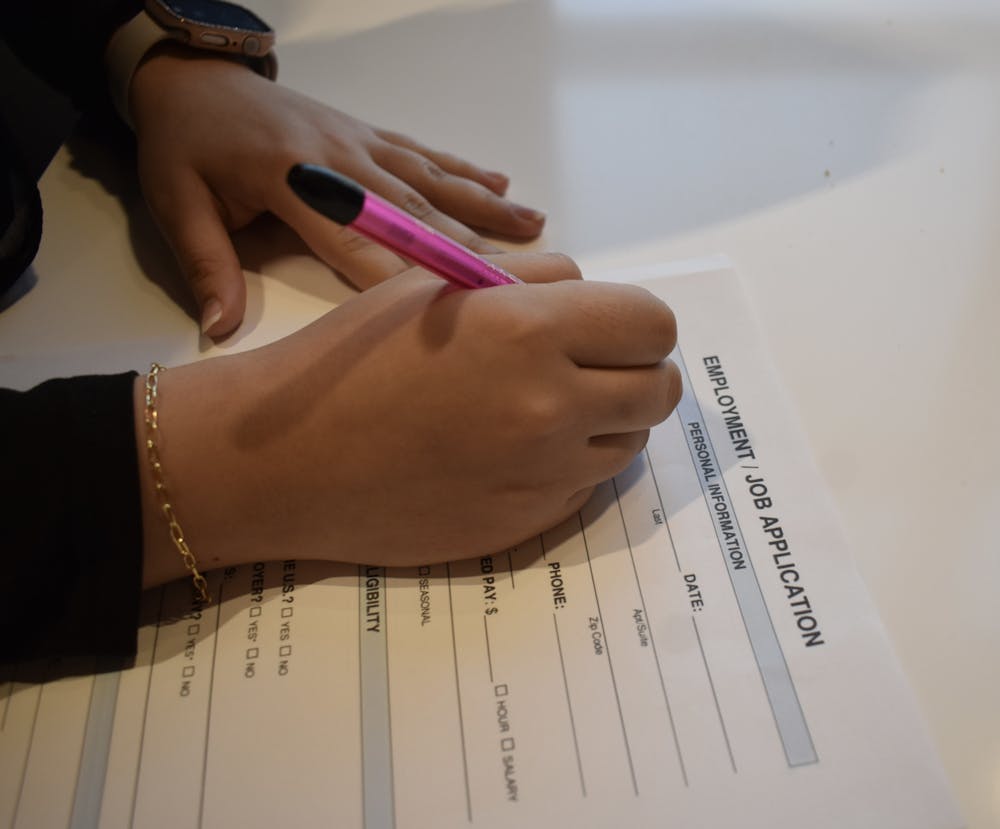People use their phones every day: texting, calling, watching, commenting, liking, and sharing. All of these actions online conglomerate into something called a “digital footprint” that creates a traceable online history for our entire lives.
Within Generation Z, people aged 16-24, the majority of whom are currently enrolled students, there is an average of between three to five hours spent on social media daily, and this number is reflected among SHU students.
Julian Gutierrez, a senior finance, technology, and accounting major, finds less time in the day to be on social media.
While still believing he’s active on social media, Gutierrez said, “I would say I average about three to five hours a day.”
However, some students reported over five hours of time spent on social media a day, such as Claudia Paradysz, a sophomore nursing major.
“I’m always on Snapchat texting my best friend,” Paradysz said. In addition, “I’m always on TikTok whenever I have downtime or need a break from studying.”
Other students, like Saniya Laners, a sophomore nursing major, go over this average. Laners reported she is on social media for “an average of seven to eight hours.”
Regardless of how much time is spent on social media, that time is tracked and forms each individual’s digital footprint, following them wherever they go.
As students work towards graduation, their activity on social media can make or break job opportunities.
Career Center Director Jorge Rivera commented on the importance of a digital footprint within the professional sphere.
“I've always thought that it was an extension of a resume,” Rivera said. “It's kind of like even a resume-in-action because [employers] could actually see more.”
“I think it's a huge benefit if the student or the applicant has their LinkedIn or their social media up to date,” Rivera added.
Social media as an extension of our resumes means that employers are looking up candidates as part of the hiring and application process.
Rivera also spoke about whether he thinks employers feel compelled to view a candidate’s social pages.
“I think employers feel like they have to,” Rivera said. “It's not even like a choice. They have to see what's out there because if they’re going to hire someone, that means they're going to invest in you.”
What people post online can have a negative effect on their professional lives, sometimes causing people to lose opportunities because they would represent the company in a negative way. That company could even be Seton Hall.
“I've heard of someone losing an opportunity [at SHU],” Laners said. “They were RAs, and they got caught drinking and someone posted online and bam—they lost their jobs,” Laners said. “Someone posted it on their close friends [Instagram story], and then someone on the close friends snitched.”
Employers aren’t only checking digital footprints before hiring but also throughout the tenure of an employee's contract with a company.
“Even after you get hired, they'll also check your social media in case you're violating company policies and you can also get fired that way,” Laners said.
Paradysz adds that they have had professors give her advice about her digital footprint in class.
“In my nursing foundations class, [my professor] was saying that you cannot post your ID or wherever you work on social media because it can come back to the place that you work and you would be penalized,” said Paradysz.
Students tend to not recognize the extent of their digital footprint and how it expands beyond what they post on social media. Rivera does an exercise every semester with his class where he has his students Google themselves.
“And I say, ‘All right, can you do me a favor and search your name and see what comes out?’ And they, a lot of times, just can't believe what's out there,” Rivera said. “The photos are out there and the comments they’ve made.”
The sentiment of a digital footprint is that, once something is out there, it’s out there forever. Oluwatobi Etuk, a sophomore diplomacy major, discusses how not everyone online is your friend and nothing disappears forever.
“There will always be that one person that wants to dig up dirt on you,” Etuk said. “And trust and believe, just because you posted it, it's out there forever, even though you delete it. Someone will take a screenshot and send it to like five other people.”
So, how aware are students of this?
Micayla Tarby, a junior diplomacy and philosophy major, recounted some of the posts made by her peers.
“I don’t think Seton Hall students are conscious enough,” Tarby said. “I see a lot of people posting photos from parties with drugs or alcohol in the background or posting photos in extremely revealing clothes to the point where it's kind of, like, half nudity. And if your future employer sees those, you probably won't get hired.”
Tarby continued to share a unique perspective as a member of Alpha Omicron Pi, where they have stricter rules representing an organization like a sorority or fraternity.
“Being in a sorority, you're not allowed to post anything where there's a red solo cup in the background, with alcohol bottles—any of that,” Tarby said. “Unless you're in a country where you're of age, but you have to tag the country.”
DeAndra Diggs, a junior theater major, expressed concern over some of the things she’s seen people post throughout the years on social media, and notably Fizz, an anonymous social media app specifically for SHU students.
Through her three years at college, she has been shocked by “the amount of stuff that [she’s] seen on Snapchat [and] on Instagram of people posting videos without censoring people's faces [while partying],” said Diggs. “People want to capture the moment instead of thinking.”
Digital footprints don’t always have to be negative. Rivera believes a good use of online presence can be a benefit to students. For example, “if students go into LinkedIn twice a week and add information that pertains to their industry or to their major,” he said.
“Do something that employers want to see,” Rivera said. “Not every applicant that's competing for their job is doing that.”
With an increasingly intense job market, an applicant’s digital presence may be the factor that makes or breaks getting that opportunity. Through being conscious and intentional with online personas, especially on professional profiles like LinkedIn, the chances of securing jobs could increase.
Kaitlyn Campeau is a writer for The Setonian’s Features section. She can be reached at kaitlyn.campeau@student.shu.edu.





